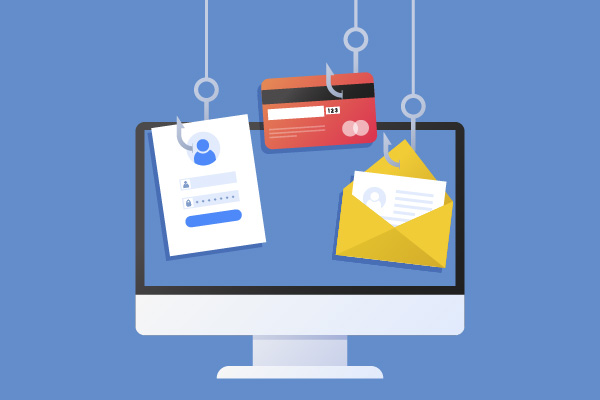
Gone Phishing: 10 Clues You Have a Scam In Your Inbox
At Allied Healthcare Federal Credit Union, we are dedicated to helping our members protect themselves from cyber threats. Every day, these threats are becoming increasingly sophisticated, so it’s crucial to stay vigilant and protect ourselves from phishing attacks.
Phishing emails are deceptive messages designed to trick unsuspecting individuals into revealing sensitive information or downloading malware. Let’s have a look at ten clues that can help you identify a phishing email and keep your personal information secure.
- Suspicious or mismatched sender address
Phishing emails often come from deceptive senders. Check the sender’s email address closely for any misspellings, unusual characters, or a domain that doesn’t match the organization it claims to represent. For example, there’s a big difference between info@linkedin.com and info@1inkedin.com, even if they look the same. Ditto for @amazon.com and @amaz0n.com. Legitimate organizations usually have professional email addresses. - Urgent or threatening language
Phishing emails often employ urgent or threatening language to create panic and prompt immediate action. Be cautious if you receive an email demanding immediate action or claiming dire consequences for inaction. Legitimate organizations usually maintain a more professional tone. - Generic greetings or lack of personalization
Phishing emails often lack personalization and may use generic greetings like “Dear Customer” instead of addressing you by name. Legitimate organizations usually personalize their emails by addressing you with your name. - Poor grammar and spelling errors
Phishing emails frequently contain noticeable grammar and spelling mistakes. This can be a red flag, as reputable organizations generally proofread their communications. If you notice multiple errors, exercise caution before proceeding. - Unexpected or suspicious attachments or links
Phishing emails often include attachments or embedded links that may lead to malicious websites or malware downloads. Avoid clicking on suspicious links or downloading attachments from unknown sources. Verify the sender’s legitimacy before interacting with any attachments or links. - Requests for personal information
Phishing emails frequently request sensitive personal information such as passwords, credit card details or social security numbers. Legitimate organizations never ask for such information via email. This includes Allied Healthcare FCU; we will never request personal information through email. Be wary of any email requesting personal data and avoid providing it unless you are certain of the sender’s authenticity. - Unusual URLs or domain names
Hover over hyperlinks in emails to reveal the actual URL destination. Phishing emails often contain deceptive URLs that may look similar to legitimate sites. Check for misspellings, additional characters, or variations in the domain name. Legitimate websites typically have consistent and recognizable domain names. - Unexpected prize or lottery notifications
Phishing emails may claim that you have won a lottery or prize. Be skeptical of unsolicited emails announcing winnings, especially if you haven’t participated in any contests. Remember, if it sounds too good to be true, it probably is! - Poorly designed or inconsistent formatting
Phishing emails often lack the professional design and formatting of legitimate communications. Look for signs of poor layout, inconsistent fonts, or distorted images. Be cautious if the email appears unprofessional or deviates from the organization’s usual communication style. - Sense of urgency or fear tactics
Phishing emails often try to create a sense of urgency or fear to manipulate recipients into taking immediate action. They may warn of account suspensions, unauthorized activities, or security breaches. Take a moment to assess the situation calmly and independently verify the claims before proceeding.
Phishing attacks continue to pose a significant threat to online security. By familiarizing yourself with the clues that something is amiss, you can develop a keen eye for spotting phishing emails. Remember to stay cautious, think critically, and trust your instincts. When in doubt, reach out to the organization directly through trusted contact channels to verify the legitimacy of any suspicious emails. By staying alert and proactive, you can protect yourself and your sensitive information from falling into the hands of cybercriminals.



